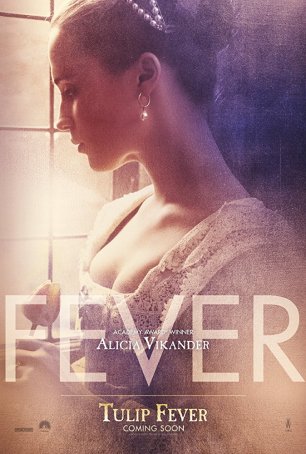Tulip Fever (United Kingdom/United States, 2017)
September 02, 2017
The warning signs were there that Tulip Fever was not going to be a good film. The movie had a troubled production history with hiccups and false starts resulting in an “unreleaseable” cut that has sat around gathering dust since principal photography completed in 2014. Since then, The Weinstein Company has set and slipped at least four intended release dates, finally deciding to dump the picture into theaters during the lowest-traffic weekend of the year. It was not screened for critics and I can’t recall any other title with three Oscar winners being hidden this way. (Although the cast of Collateral Beauty had collected more nominations, that rightfully reviled film had only two actors who took home statues.)
At one time during its lifecycle, Tulip Fever had Oscar aspirations. TWC thought to pimp it for the 2015 season until they got a look at the finished product. Lifeless, contrived, and sleep-inducing, it’s an example of how badly wrong a film can go. One supposes this is a book that should have remained unadapted; by all accounts, the novel (which I haven’t read) is a solidly written and researched piece of historical fiction.
 Events take place during Amsterdam’s tulip craze of 1636-37,
when the demand for the “new” flowers was so great that bulbs went for
outrageous prices. There are odd parallels to today’s stock market (emphasized
during several auction scenes) but those are left in the background. The main story
involves the forbidden love between a young orphan-turned-lady, Sophia Sandvoort
(Alicia Vikander), and a penniless painter, Jan Van Loos (Dane DeHaan). Plucked
out of obscurity to be the second wife (for baby-making purposes) of
businessman Cornelis Sandvoort (Christoph Waltz), Sophia endures the daily drudgery
of her life with stoic indifference. She doesn’t love her husband, although he
is kind to her, and is unable to conceive a child. Her only friend is her maid,
Maria (Holliday Grainger), who is carrying on with a local fishmonger, Willem
Brok (Jack O’Connell). For Sophia, it’s love at first sight when she sets eyes
on Jan, whom Cornelis has hired to paint a husband-and-wife portrait. Sophia’s
decision to strip naked for Jan and join him in bed has tragic consequences for
nearly everyone, especially those who spent money to see the movie.
Events take place during Amsterdam’s tulip craze of 1636-37,
when the demand for the “new” flowers was so great that bulbs went for
outrageous prices. There are odd parallels to today’s stock market (emphasized
during several auction scenes) but those are left in the background. The main story
involves the forbidden love between a young orphan-turned-lady, Sophia Sandvoort
(Alicia Vikander), and a penniless painter, Jan Van Loos (Dane DeHaan). Plucked
out of obscurity to be the second wife (for baby-making purposes) of
businessman Cornelis Sandvoort (Christoph Waltz), Sophia endures the daily drudgery
of her life with stoic indifference. She doesn’t love her husband, although he
is kind to her, and is unable to conceive a child. Her only friend is her maid,
Maria (Holliday Grainger), who is carrying on with a local fishmonger, Willem
Brok (Jack O’Connell). For Sophia, it’s love at first sight when she sets eyes
on Jan, whom Cornelis has hired to paint a husband-and-wife portrait. Sophia’s
decision to strip naked for Jan and join him in bed has tragic consequences for
nearly everyone, especially those who spent money to see the movie.
Like many complex novels crammed into 100-page screenplays, Tulip Fever is a mess of too many subplots, all awkwardly condensed and fighting for screen time. Tone inconsistencies abound – although this is primarily a period drama, there are instances of inappropriate comedy and attempts to provide a history lesson. The plot is anchored by a series of hard-to-swallow contrivances that resemble the so-called “soap opera coincidence syndrome” in which artificial devices are foisted on the viewer to force the story in a certain direction.
Nearly every role is miscast, which is rather amazing. Christoph Waltz and Judi Dench (as an abbess) are perhaps the exceptions. Waltz, in limited screen time, creates a character whose public persona is bloated and pompous but who is secretly haunted by past secrets and genuinely loves his young wife. Dench has so little screen time that she was clearly included in a rather anonymous role for the cache her name would bring.
 At the time she made Tulip
Fever, Alicia Vikander has not yet “broken through”. Her standout role in Ex Machina was still under wraps and the
Oscar was two years away. This is arguably her weakest performance, although
the awkwardness she displays could be the result of a failed choice made by
director Justin Chadwick. Dane DeHaan, whose career has lately been in a
tailspin, is too “modern” (for lack of a better word) for a 17th century painter.
Supporting players Tom Hollander and especially Zach Galifianakis cause the
viewer to wonder whether the producers lost their minds when filling out the supporting
roles. Attempts at humor by these two not only fail to amuse but ruin every
scene in which they occur.
At the time she made Tulip
Fever, Alicia Vikander has not yet “broken through”. Her standout role in Ex Machina was still under wraps and the
Oscar was two years away. This is arguably her weakest performance, although
the awkwardness she displays could be the result of a failed choice made by
director Justin Chadwick. Dane DeHaan, whose career has lately been in a
tailspin, is too “modern” (for lack of a better word) for a 17th century painter.
Supporting players Tom Hollander and especially Zach Galifianakis cause the
viewer to wonder whether the producers lost their minds when filling out the supporting
roles. Attempts at humor by these two not only fail to amuse but ruin every
scene in which they occur.
Tulip Fever’s pacing is torpid, never generating any energy. The tragic central romance fails to ignite; Vikander and DeHaan display no chemistry despite repeatedly appearing naked in one another’s arms. Rarely has so much flesh resulted in so little eroticism. A bizarre story twist about faking a pregnancy is so awful that it’s hard to believe anyone thought this might be a good idea. And the lessons about the tulip craze bring the film’s uncertain dramatic momentum to a halt. The best thing I can say about Tulip Fever is that it’s professionally made – the period details are impeccable and Danny Elfman’s score works. Overall, however, this is a reminder of the dangers of developing a “prestige” picture for the sole purpose of being Oscar bait. If things go wrong, such movies can end up orphaned and set adrift on Labor Day weekend to be rightfully ignored by viewers of all demographics.
Tulip Fever (United Kingdom/United States, 2017)
Cast: Alicia Vikander, Dane DeHaan, Jack O’Connell, Holliday Grainger, Christoph Waltz, Judi Dench, Zach Galifianakis, Cara Delevingne, Tom Hollander
Home Release Date: 2017-11-28
Screenplay: Deborah Moggach and Tom Stoppard, based on the novel by Deborah Moggach
Cinematography: Eigil Bryld
Music: Danny Elfman
U.S. Distributor: The Weinstein Company
U.S. Release Date: 2017-09-01
MPAA Rating: "R" (Sexual Content, Nudity)
Genre: Drama
Subtitles: none
Theatrical Aspect Ratio: 2.35:1

Comments